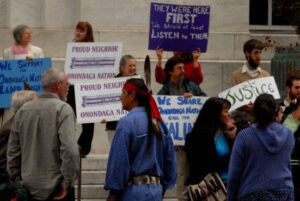
New York City- On Columbus Day, Friday, October 12, 2012, the Onondaga Nation’s legal team, consisting of Joe Heath as General Counsel and lead counsel, Curtis Berkey and Alex Page, appeared in the US 2 Circuit Court of Appeals and for the oral argument against the dismissal of the Nation’s Land Rights Action.
The case had been dismissed in September of 2010, by Judge Kahn of the District Court, in a decision in which he wrote that he was “mandated” to dismiss our case due to the Circuit’s August 2010 dismissal of the Oneida Nation land claim.
These dismissals are the result of an ever-changing body of law that is being created by the federal courts against Indian Nations, which began in March of 2005, three weeks after the filing of the Nation’s Land Rights Action. In the case of City of Sherrill v. Oneida, the Supreme Court ruled that Oneida could not “re-kindle” long dormant sovereignty or jurisdiction over lands that had purchased, within their Canandaigua Treaty reservation. That ruling claimed that is was simply not fair for Oneidas to have waited so long.
As bad as this decision was, it was followed in June of 2005 by the 2nd Circuit’s use of it as the basis to dismiss the entire Cayuga Nation land claim. The Circuit used the Sherrill decision to say that any land claim that was 200+ years old and that was “possessory” in nature was “too disruptive” and must be dismissed. The Cayugas had framed their case with a demand for immediate possession of their entire homeland, including evicting the current land owners. The next blow in this deteriorating legal picture came with the August 2010 dismissal of Oneida case by the 2nd Circuit.
The Onondaga case has been lumped in with these other cases, even though it was framed fundamentally differently. The Onondaga Land Rights Case did not seek immediate possession of the lands or eviction of current landowners, but only asked for two declaratory judgments:
(1) That New York’s takings of the Onondaga homelands had violated the Treaties, the US Constitution and the Trade and Intercourse Act; and
(2) that, therefore, according to the federal law, the takings were void.
Finally, the Onondaga case also called for healing of the land and waters; and also with all people who live within the Onondaga original territory.
The Nation lawyers were not surprised that after Judge Kahn’s dismissed the Onondaga case, that the 2nd Circuit would state that the Onondaga case was the same as the Oneida and Cayuga cases and that it should also be dismissed for the same reasons. The task for the Nation lawyers at oral argument was made even more difficult by two other factors. The first was that, according to the court rules, the three judge panel hearing our case did not have the authority to overrule the Oneida dismissal. The second was the panel itself. One of three judge panelists, who had been assigned to hear our arguments, was Judge Debra Ann Livingston, the author of the Oneida dismissal!
Despite all these difficulties, Alex, Curtis and Joe devised a strategy to try to convince the Circuit to reverse the earlier decision and send the case back to the District Court to give the Nation a chance to prove our facts, and that our facts are very different from those in Cayuga and Oneida. To do this, the court was asked to focus on the 1795 illegal taking by the state, which was Onondaga Lake and a mile around it–to show that the facts were very different that those used to dismiss the other cases.
This strategy seemed to have been successful, as least for last Friday, in that the judges picked up on our argument and the state lawyers seemed caught by surprise and did not perform well. The judges reserved their decision and will enter a written decision sometime in the next few months. It is never possible to predict how judges will rule from their behavior and questioning during oral argument, but Friday went better than anticipated. It may well be that the judges were on their best and most courteous behavior because court was held in a packed law school auditorium, with over 100 law students present, along with a large number of Nation citizens, NOON members, and other supporters.
The Nation awaits their written decision and hope that they agree to send the case back to the lower court for a chance to prove our case. However, if they rule against the Nation, the next step is to ask the full [13 judges] Circuit hear the case, as they would have the authority to change the Oneida dismissal and it’s very difficult standards. If the full Circuit will not hear that request, we will ask the Supreme Court to review the case; and if they refuse or eventually rule against the Nation, the next step is to bring this land theft to an international forum, such as the OAS International Commission on Human Rights.
